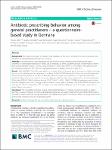Antibiotic prescribing behavior among general practitioners – a questionnaire-based study in Germany
Salm, Florian
Schneider, Sandra
Schmücker, Katja
Petruschke, Inga
Kramer, Tobias S.
Hanke, Regina
Schröder, Christin
Heintze, Christoph
Schwantes, Ulrich
Gastmeier, Petra
Gensichen, Jochen
RAI-Study Group
Background
This study investigates the barriers and facilitators of the use of antibiotics in acute respiratory tract infections by general practitioners (GPs) in Germany.
Methods
A multidisciplinary team designed and pre-tested a written questionnaire addressing the topics awareness of antimicrobial resistance (7 items), use of antibiotics (9 items), guidelines/sources of information (9 items) and sociodemographic factors (7 items), using a five-point-Likert-scale (“never” to “very often”). The questionnaire was mailed by postally to 987 GPs with registered practices in eastern Germany in May 2015.
Results
34% (340/987) of the GPs responded to this survey. Most of the participants assumed a multifactorial origin for the rise of multidrug resistant organisms. In addition, 70.2% (239/340) believed that their own prescribing behavior influenced the drug-resistance situation in their area. GPs with longer work experience (> 25 years) assumed less individual influence on drug resistance than their colleagues with less than 7 years experience as practicing physicians (Odds Ratio [OR] 0.32, 95% Confidence Interval [CI] 0.17–0.62; P < 0.001). 99.1% (337/340) of participants were familiar with the “delayed prescription” strategy to reduce antibiotic prescriptions. However, only 29.4% (74/340) answered that they apply it “often” or “very often”. GPs working in rural areas were less likely than those working in urban areas to apply delayed prescription.
Conclusion
The knowledge on factors causing antimicrobial resistance in bacteria is good among GPs in eastern Germany. However measures to improve rational prescription are not widely implemented yet. Further efforts have to be made in order to improve rational prescription of antibiotic among GPs. Nevertheless, there is a strong awareness of antimicrobial resistance among the participating GPs.
Files in this item

